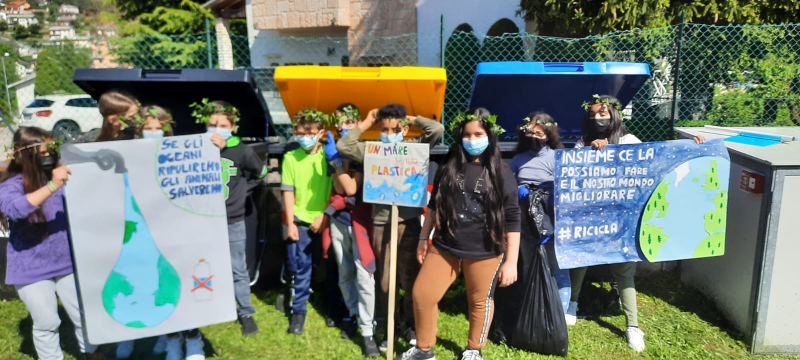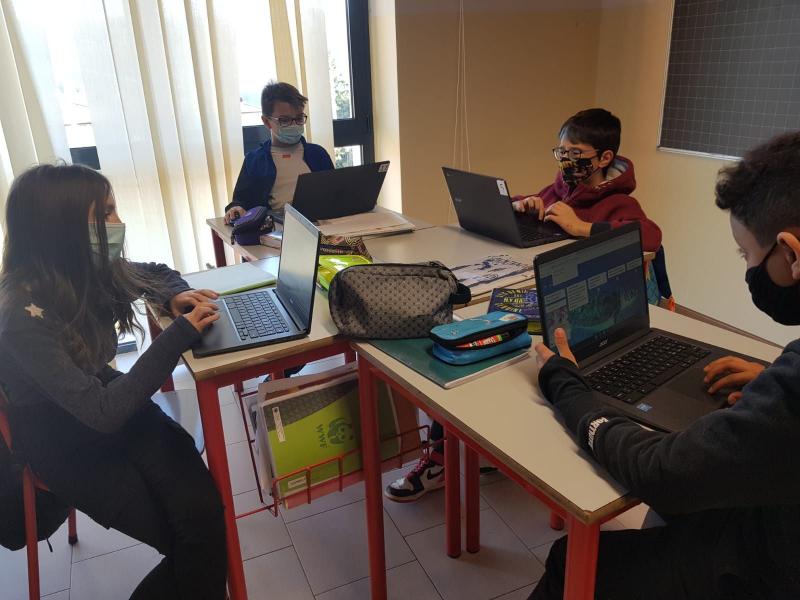Author: class V, Primary school, I.C. Bosco Chiesanuova, Corbiolo, Verona (IT)
Partners: classes III A and III B, Primary school, “I.S. Abbé J.M. Trèves”, Saint-Vincent, Vallée d'Aoste (IT)
Introduction

Keeping litter off the streets (Owner of the Image)
Nowadays, plastic, and especially microplastics, is considered a major form of pollution and one of the most serious threats to marine ecosystems. This huge problem affects the entire planet, not just those who live near the seaside. We use plastic everywhere, from packaging food to medical appliance. Plastic can be recycled but some waste ends up in the environment. Even if you live hundreds of miles from the coast, the plastic you throw away could make its way into the oceans.
In this Seedquest you will focus on the beauty of the sea and what it offers us and then you will analyze some academic and non-academic sources to become aware of the widespread problem of plastic pollution. After that, you will find ways that can help prevent pollution from harming our ecosystem and our marine life. You will learn practical tips to use less plastic in everyday life because each of us has the power to make the difference.
Once you have gathered all the information you need, you will have to organize a cleaning of your local street and create a comic strip.
Learning Objectives
- Filter simple information from the net and compare it with other sources
- Sorting waste correctly and explaining the reason for it
- Recognize the effects of environmental degradation and formulate possible courses of action through the creation of graphic and multimedia products
Task

Pupils’ research (Owner of the Image)
You will have to complete the following tasks:
- Do a Brainstorming on the topic “A sea without plastic”. What does your team know on this thematic? You can have access to pupils’ prior knowledge.
- Read “Wave” by S. Lee. In this evocative wordless book, the artist tells the story of a little girl's day at the beach. She explores the power of the natural world, the power of ocean. But, what will happen if we don't take care of the oceans and we don’t change our habits? Will there be more plastic than fish in the oceans by 2050?
- Fill in a questionnaire about plastic habits. It will help you understand the pupils’ perception and awareness regarding plastic pollution.
- Gather information on the topic “A sea without plastic”: pupils will search information on the net on three subtopics: Plastic Pollution – Plastic Recycling – General recommendations for actions to reduce plastic pollution.
- Organize a cleaning of your local street. Do pupils classify waste correctly? And when they are at school, how do they deal with recycling?
- Create an interactive comic strip: readers will make choices while reading it. Will their choices be sustainable for the environment?
Process
- Doing a Brainstorming
Your team is divided into small groups. Each member writes down on a poster all the words that are associated with the central term: A sea without plastic. In rotation the groups exchange the posters, so that everyone can read the work of the other groups and enrich the posters with other words written after the first phase.
- Reading “Wave” by S. Lee
Each of you selects at least one illustration from the silent book. After an individual work, the entire team works together to write a collective text. Let’s focus on the beauty of the sea and what it offers to us: shells, starfishes, playing with seagulls but also happiness and relax.
- Filling a questionnaire about plastic habits
Each of you individually fill in the questionnaire to gain awareness of plastic pollution on beaches and your own plastic habits (how much plastic you use and recycle daily, at home or school, etc.)
- Gathering information
Your team is divided into three groups to collect information about the following sections:
- Plastic Pollution. What is the problem with plastics in the environment? Where do plastics come from? Where are they going? What problems are they causing and why?
--> See Resources 1-2 from Websites, Resources 1-2-3 from Videos and Resource 4 from Documents - Plastic recycling. What plastics can become?
-->See Resource 4 from Websites, Resource 5 from Videos and Resource 1 from Documents - General recommendations for actions to reduce plastic pollution. Is there a solution? Can we use less plastic?
--> See Resources 3-5 from Websites, Resource 4 from Videos and Resources 2-3-5 from Documents
Each article can be collected on Padlet platform, so that everyone in your team can have access to it.
- Plastic Pollution. What is the problem with plastics in the environment? Where do plastics come from? Where are they going? What problems are they causing and why?
- Organizing a cleaning of your local street
Each group receives a different waste bag to pick up litter: some will collect wet waste, some plastic, some mixed waste and some paper.
- Creating an interactive comic strip
You will have to create a comic strip with a branching-plot, which require the reader to make choices. Will his/her choices be sustainable for the environment? What happens if the reader takes another path?
After writing the ideas for your comic (plot, location, characters, etc.), you can divide the team into four groups:
- Drawing group: draw the comic strips
- Color group: colorize your panels
- Writing group: add in the lettering for your speech into your speech balloons
- Graphics group: lay out your comic strip using the Book Creator App.
Evaluation
- Plastic Pollution (Agenda 2030, Goal 14)
- Waste sorting
- Respectful behaviors for natural environment
- Search correctly for information on the web
- Classifying waste and developing its activity of recycling
- Behave in a way that respects and protects natural environment
- Pupils are able to use different devices correctly and navigate safely
- Pupils know how to classify waste and develop recycling activities
- Pupils promote respect for the environment and nature and can recognize the effects of degradation and neglect
Here you can find an assessment rubric:
|
# |
Beginning (1) |
Developing (2) |
Qualified (3) |
Exemplary (4) |
|
Filter, with the help of an adult, simple information from the net and compare it with other sources, including paper-based sources. |
With precise instructions, examples and guiding questions, the pupil uses the web to search and select information useful for solving a task. |
The pupil can search for simple information on search engines useful for solving the task and if appropriately guided, he/she can compare it with other sources previously identified in class. |
The pupil can filter information from the Internet and compare it with other sources previously identified in class. |
The pupil can, in complete autonomy, filter information from the Internet and compare it with other sources: books, oral testimonies, shared rules, personal experience, etc. |
|
Identify and implement correct actions and behaviours to protect environment. |
Guided by teacher, the pupil understands how to classify waste. |
The pupil understands how to classify waste. Guided by the teacher, he/she recognises and implements a respectful and correct behaviours, aimed at safeguarding environment. |
The pupil classifies waste in a correct way. If he/she is in a similar situation that he/she has already faced, the pupil can recognise and implement a respectful and correct behaviours, aimed at safeguarding environment. |
The pupil consciously classifies waste, developing the recycling activity. He/she recognises and implements a respectful and correct behaviours, aimed at safeguarding environment. |
|
Recognise the effects of environmental degradation and formulate possible courses of action through the creation of graphic and multimedia products. |
If guided, the pupil recognises the effects of environmental degradation and formulates possible courses of action through the creation of graphic and multimedia products. |
The pupil recognises the effects of degradation and neglect and, if directed, formulates possible courses of action through the creation of graphic and multimedia products. |
The pupil recognises the effects of deterioration and neglect and, he/she starts to formulate possible courses of action through the creation of graphic and multimedia products. |
The pupil recognises the effects of deterioration and neglect and he/she formulates possible courses of action in a clear and appropriate manner through the creation of graphic and multimedia products. |
|
Filter, with the help of an adult, simple information from the net and compare it with other sources, including paper-based sources. |
Identifies and implements correct actions and behaviours to protect the environment. |
Recognise the effects of environmental degradation and formulate possible courses of action through the creation of graphic and multimedia products. |
||||||||||||
|
Pupil |
1 |
2 |
3 |
4 |
1 |
2 |
3 |
4 |
1 |
2 |
3 |
4 |
Notes |
|
|
… |
||||||||||||||
Conclusion
Each of us uses plastic daily, that we cannot imagine our lives without. With this SeedQuest your group will learn:
- the problem of plastic pollution, that affect negatively our planet and our lives;
- how to recycle waste;
- Tips on how reduce the usage of plastic.
In addition to all the suggested activities, your group can also make something out of plastic, using plastic bottles for example.
Links
Plastic in the ocean: the facts, effects and new EU rules
https://www.europarl.europa.eu/news/en/headlines/society/20181005STO15110/plastic-in-the-ocean-the-facts-effects-and-new-eu-rules
A story of a little girl and a sea turtle to raise awareness on the issue of plastic pollution killi
https://media.greenpeace.org/archive/Rainbow-Warrior-in-Taiwan--Sea-Turtle-and-Girl-s-Plastics-Story-Animation-27MZIFJWRO0NQ.html
The problem with plastic in nature and what you can do to help
https://www.worldwildlife.org/stories/the-problem-with-plastic-in-nature-and-what-you-can-do-to-help
Teachers Section
You can use the following search engines to search safely for information:
- http://www.ilnocchiero.it/
- https://www.safesearchkids.com/
- https://www.qwantjunior.com/
- https://www.focusjunior.it/
All the materials can be collected on Padlet, an online notice board.
You can read the comic strip created by Corbiolo Primary School (IC Bosco Chiesanuova, Verona, Italy) at the link below: https://read.bookcreator.com/xYzCMhw7jjV0wickUatYlc7Xh3p1/3qXyH44yRlGR3-XhKgAVgA (Italian version)
You don’t need to be logged in to read it. If you want to create one yourself, you need to sign into Book Creator: https://bookcreator.com/
As regard the evaluation section, don’t forget the self-evaluation. Here you can find an example:
|
1 |
2 |
3 |
4 |
Notes: |
|
|
Was I able to find the information I needed on the web? |
|||||
|
Was I able to implement behaviours and actions to respect the environment? |
|||||
|
Was I able to provide ideas for the realization of the comic strip? |
Teacher Links:
ReSource: Plastic Reaches its First Milestone with Transparent 2020
https://www.worldwildlife.org/blogs/sustainability-works/posts/resource-plastic-reaches-its-first-milestone-with-transparent-2020
Join the Fight Against Plastic Pollution
https://support.worldwildlife.org/site/Advocacy?cmd=display&id=1002&page=UserAction&utm_campaign=plastics&utm_content=wwfact&utm_medium=social&utm_source=twitter.com
https://www.focusjunior.it/news/favara-la-prima-scuola-che-rinuncia-alla-plastica/
Let's protect the environment: Favara is the first school to give up plastics
WWF Launches Activation Hub to Help Prevent 10 Million Metric Tons of Global Plastic Waste
https://www.worldwildlife.org/press-releases/wwf-launches-activation-hub-to-help-prevent-10-million-metric-tons-of-global-plastic-waste
Teacher Documents:
A plastic oceanGuidelines to plastic free













